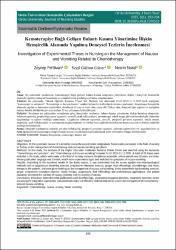Kemoterapiye bağlı gelişen bulantı kusma yönetimine ilişkin hemşirelik alanında yapılmış deneysel tezlerin incelenmesi
Citation
Pehlivan, Z., Gülhan Güner, S. & Nural, N. (2023). Kemoterapiye Bağlı Gelişen Bulantı Kusma Yönetimine İlişkin Hemşirelik Alanında Yapılmış Deneysel Tezlerin İncelenmesi. Ordu Üniversitesi Hemşirelik Çalışmaları Dergisi, 6(1), 193-204. https://doi.org/10.38108/ouhcd.1070519Abstract
Amaç: Bu sistematik incelemede, kemoterapiye bağlı gelişen bulantı-kusma semptomu yönetimine ilişkin Türkiye’de hemşirelik
alanında yapılmış deneysel lisansüstü tez çalışmalarının gözden geçirilmesi amaçlanmıştır.
Yöntem: Bu çalışmada, Yüksek Öğretim Kurumu Ulusal Tez Merkezi veri tabanında 01.01.2010-31.12.2020 tarih aralığında
“kemoterapi ve semptom”, “kemoterapi ve bulantı-kusma” anahtar kelimeleri kullanılarak tarama yapılmıştır. Araştırmaya hemşirelik
alanında yapılan ve tamamına erişilebilen, örneklemi 18 yaş ve üzeri olan, yayın dili Türkçe olan, deneysel tipte yapılan ve içeriğinde
bulantı-kusma semptomu yer alan toplam 23 tez çalışması dahil edilmiştir.
Bulgular: İncelenen tez çalışmaları sonuçlarına göre, hemşireler tarafından bulantı-kusma yönetimine ilişkin hastalara akupresür,
solunum egzersizi, progresif gevşeme egzersizi, zencefil, ayak refleksolojisi, aromaterapi, müzik terapi gibi nonfarmakolojik yöntemler
uygulandığı ve eğitim verildiği saptanmıştır. Uygulanan solunum egzersizi, zencefil, progresif gevşeme egzersizi, müzik terapi,
akupresür, ayak refleksolojisi ve aromaterapi uygulamalarının ve verilen hasta eğitimlerinin bulantı-kusma sayısını ve bulantı şiddetini
azalttığı belirlenmiştir.
Sonuç: İntegratif yaklaşımlar arasında yer alan refleksoloji, progresif gevşeme egzersizi, solunum egzersizleri vb. uygulamaların ve
hasta eğitimlerinin kemoterapiye bağlı bulantı-kusma yönetiminde kullanılabilecek etkili yöntemler olduğu belirlenmiştir. Objective: In this systematic review, it is aimed to review the experimental postgraduate thesis studies conducted in the field of nursing
in Turkey on the management of chemotherapy-induced nausea-vomiting symptoms.
Methods: In this study, the database of the Higher Education Institution National Thesis Center was searched using the keywords
"chemotherapy and symptom", and "chemotherapy and nausea-vomiting" between 01.01.2010-31.12.2020. A total of 23 theses were
included in the study, which were made in the field of nursing and were completely accessible, whose sample was 18 years and older,
whose publication language was Turkish, which were experimental type, and included the symptoms of nausea-vomiting.
Results: According to the examined results of the thesis studies, it was determined that the nurses applied non-pharmacological
methods such as acupressure, breathing exercise, progressive relaxation exercise, ginger, foot reflexology, aromatherapy, and music
therapy to the patients, and were given training on the management of nausea and vomiting. It was determined that breathing exercise,
ginger, progressive relaxation exercise, music therapy, acupressure, foot reflexology and aromatherapy applications, and patient
education decreased the number of nausea-vomiting and the severity of nausea.
Conclusion: It has been determined that applications such as reflexology, progressive relaxation exercises, respiratory exercises, which
are among the integrative approaches, and patient education are effective methods that can be used in the management of chemotherapyinduced nausea-vomiting.


















